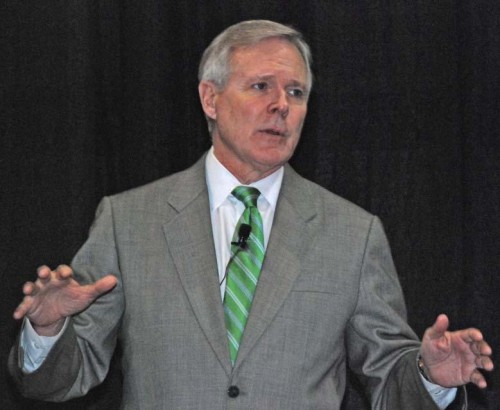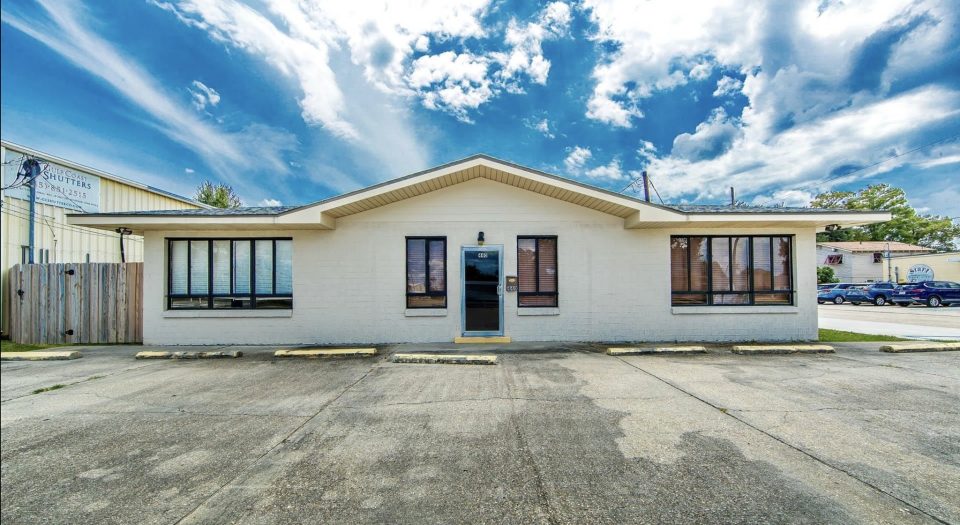
Eve Guidry
August 16, 2010Hornets acquire Ariza in four-team trade
August 18, 2010His family has lived on the Gulf Coast in Mississippi for four generations, and now that BP’s well is finally capped, U.S. Secretary of the Navy Ray Mabus returned to the coast to discuss the government’s plan for long-term restoration.
“The president gave me a very specific job,” Mabus said in front of an audience at the Houma-Terrebonne Civic Center last week.
“We’re going to look to see what needs to be done to bring the Gulf back environmentally, bring the Gulf back economically, bring the Gulf back in terms of health care and mental health,” he said.
Local government officials are glad to see the well is capped, but are skeptical about the future for south Louisiana.
“My concerns are what lies below the surface of the water and how we’re going to handle it when it starts reaching the beaches in six to 12 months because it’s going to have to come onshore somewhere,” said Terrebonne Councilman Joey Cehan. “I’m a little nervous about it, but I think BP knows that the job isn’t completed yet just because the well is capped. They still have responsibility as far as the clean up goes.”
While environmental, economical and mental health concerns blanket a plethora of problems that have been plaguing the coastal parishes since the Deepwater Horizon oilrig explosion April 20, many local officials and organization representatives boiled the biggest priority down to a single word: protection.
“To this date, the federal government has not built any portion of the Morganza levee protection system or the lock here in Terrebonne Parish, even though it’s been under study for 20 years,” said Berwick Duval, president of the Morganza Action Coalition. Duval added the Morganza levee system would protect over 200,000 residents in Terrebonne and Lafourche parishes.
“If a project to protect the 200,000 people of this area has to be studied for 20 years, finally get passed by Congress and in 2010 we still have no federal dollars, the system is fundamentally broken,” Duval said. “You need to address that. We can’t wait 25 to 30 years to provide protection. The system has to be reformed.”
Reggie Dupre, executive director of the Terrebonne Levee and Conservation District, echoed Duval’s sentiment. He asked Mabus to come up with a plan to move projects in the Gulf quicker, and not have any more projects that span 40 years from conception to implementation.
“The overarching issue is, we need to learn from our mistakes,” Dupre said. “Hurricanes Katrina and Rita became a catalyst for change in the state of Louisiana. We realized we had to change the way we were doing business. … Let’s not reinvent the wheel, I hope that this disaster in the Gulf of Mexico becomes a catalyst for the federal government to change the way they are doing business.”
Mabus also heard the voice of the United Houma Nation (UHN), whose livelihood and culture is dependent on the environment currently in jeopardy from the oil disaster.
“We rely on the waters and the land around here for our livelihood, our medicine and our culture. … We need job training dollars, environmental protection for our coastline, mobile health units, doctors and scientists who will work with us and let us know if and when it is safe to go back to work,” Chief Thomas Dardar of UHN said.
In addition to the environmental suffering, Mike Ferdinand of Terrebonne Economic Development Authority (TEDA) spoke on behalf of faltering businesses in the area.
“We had the lowest unemployment in the nation before this disaster started. Our businesses are under significant stress, and it’s my responsibility, and now yours’ to triage these businesses and try to develop a long-term recovery strategy,” Ferdinand said. He asked how these businesses would factor into Mabus’ plan.
Mabus responded he would come up with a funded structure that would involve local government participation in decision-making for businesses and other projects.
Some residents are still not convinced, however.
“This isn’t over, and it’s only just begun,” Chauvin resident Susan Felio Price said. “[BP] said that they were going to make us whole, but they can’t make us whole at this point.”
As a native to the Gulf Coast Region, Mabus affirmed that he’s going to try to hold the oil company to its promise.
“This is a Gulf issue, but this is a national concern,” Mabus said. “This part of the country has taken more body blows in the last five years than one can imagine. I lived virtually all my life in Mississippi … this place has taken more hits but come back more than any place I’ve ever seen.”
Mabus told the crowd he expects to submit plans for Gulf Coast recovery within the next few weeks.
With BP finally capping the oil well months after the Deepwater Horizon Rig exploded, Secretary of the Navy, Ray Mabus looks to south Louisianans for input on Gulf restoration plans. JENNA FARMER









